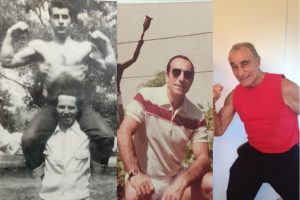 When I first heard this question posed on a radio talk show, I wondered what the host’s response would be. My mind was racing. Was he going to tell his audience we should to stop exercising when we reach at a certain age? On the contrary, he went on to say there is no age in which we should stop exercising. We slow down when our body tells us to, but we NEVER stop! Whew….what a relief! I completely agree.
When I first heard this question posed on a radio talk show, I wondered what the host’s response would be. My mind was racing. Was he going to tell his audience we should to stop exercising when we reach at a certain age? On the contrary, he went on to say there is no age in which we should stop exercising. We slow down when our body tells us to, but we NEVER stop! Whew….what a relief! I completely agree.
I often express my love for exercise and the positive affect it has on my life. Even when my doctor tells me to “take it easy” because of a strain or pain (I am not immune to injury), I hate to. I heed her advice and modify my routine. I must.
However, we do need to consider another reason we should continue to exercise in regard to some general consequences of aging. In the longevity game of life, we can develop a condition affecting our muscles called Sarcopenia. It is a Greek word (sarko) meaning flesh. It is an age-related condition that effects our ability to function in our senior years including how we walk, balance, climb steps, sit (without falling) into a chair or recover after an accident or surgery.
Sarcopenia typically arises during the fourth decade of life and accelerates after age 50, and advances even more rapidly after age 75. By age 60, Sarcopenia sufferers will lose up to 30% muscle mass, 45% by age 70 and 60% by age 80. My husband, who turned 82 this year, used to be quite buff and although he is still vibrant and strong, I can see the difference in his physique; he has developed the condition, but works hard to fight it. His muscles would be mush if he didn’t work out regularly.
Variables other than physical inactivity (such as hormonal changes) may also play a role in the development of Sarcopenia. However, adopting a sedentary lifestyle with little physical activity or regular exercise is a major contributor to this condition – one that can be addressed and changed. It is partially reversible given effective exercise training, dancing and movement.
So what do you do? Drop any excuse now and commit to moving more by trying high intensity movement exercises a few days a week. Your energy level will tell you when to slow down. Tune into to watch my Exercise Snack Video, then share it with someone you love.
If you would like to learn more about the safest and best ways to stay strong and reduce the effects of disease and have fun doing it, visit our website at www.lorimichielfitness.com or contact us via email or call 818-620-1442. We see fitness differently!
